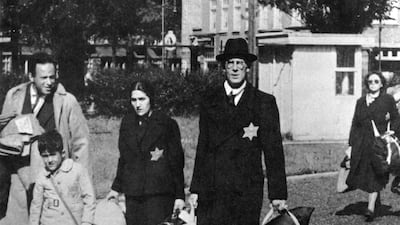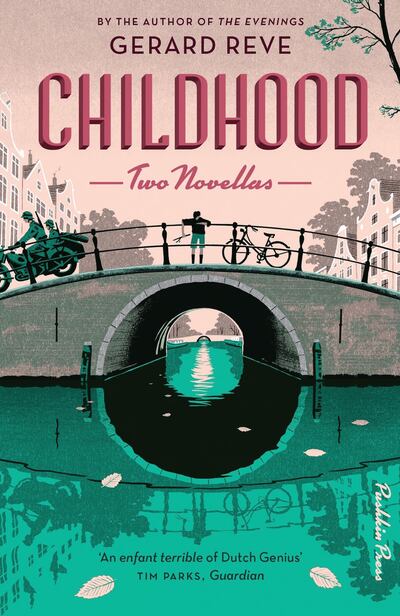Two years ago, Pushkin Press published the first English translation of Dutch writer Gerard Reve's bestselling novel The Evenings. Initially published in 1947 – just before Reve's 24th birthday – it's an account of the last few days of 1946, as experienced by one 23-year-old Frits van Egters, a young man who lives with his parents in a small flat in suburban Amsterdam. His days are occupied by work, but it's the evenings that Frits struggles with: the time stretching out in front of him, all of which needs to be filled, but remains frustratingly and near unbearably uneventful.
Strains of the same claustrophobia infect the two novellas of Childhood – Werther Nieland, which was published in 1949, and The Fall of the Boslowits Family, which appeared the following year. Both have been expertly translated by Sam Garrett, the translator also responsible for The Evenings.
The Amsterdam Reve depicts therein is a city of subterfuge, gloom and violence, both implicit and explicit. "On a Wednesday afternoon in December, when the weather was dark, I tried to wrench a drainpipe off the back of the house; this without success," reads the opening sentence of Werther Nieland. "Then I took up a hammer and pulverised a few thin twigs from the currant bush atop a post in the garden fence. The weather remained dark." Reve's narrator is 11-year-old Elmer, a boy with a malicious streak who turns his attention towards a new boy in the neighbourhood, the "pale, sallow-skinned" Werther. "There will be a club," Elmer dictates. "Important messages have been sent already. If anybody wants to ruin it, he will be punished."
The novella plunges the reader headfirst into the superstition and ritual-ruled world of childhood, one in which actions and events hold different meanings to those understood by adults. Elmer is a complex creation; his ordinary youthful naivety combines with some shocking instances of calculated cruelty, both in terms of nasty emotional manipulation and the inflicting of physical violence on those weaker than him. Such moments of brutality often appear out of nowhere, disappearing again just as quickly.
“I called our cat, a grey with white spots, up to the attic and cuddled her for a while. Then I went downstairs and fetched a few biscuits. Returning, I took a long, rectangular crate that had once contained tea and placed it in unsteady balance at the top of the stairs, with the opening towards me. I fed the cat a few pieces of biscuit, then tossed the last bits into the crate. When the animal climbed in, its weight threw the whole thing out of balance and it crashed, crate and all, down the stairs. I observed the fall closely. Then I went back to reread the text about plants.”
The matter-of-fact way that Reve has Elmer relate his exploits makes the episode all the more unsettling. Indeed, both here and in The Fall of the Boslowits Family, Reve demonstrates a keen understanding of what it's like to see the world through the eyes of a child. Set in wartime Amsterdam, a young boy named Simon watches with increasing fear and confusion as his parents' friends, the Boslowits – a Jewish family – become the victims of increasingly horrific persecution.
Whereas Werther Nieland looks inward, almost to the exclusion of the wider world, The Fall of the Boslowits Family looks outward; it's about a child's attempts to make sense of what he sees happening to the adults around him. Reve is acutely aware of exactly what a child would take notice of and what he wouldn't. "That was the moment at which the conversation captured my attention," Simon reports of a discussion between the grown-ups about the impending outbreak of war. While shortly after this, he recounts the happenings of a particular day as boiling down to "two events of interest."
____________________
Read more:
A whole new world: Behind the new translation of Aladdin
New cookbook explores Emirati food culture and traditions
The Emirati engineer who became an author, and then started a publishing house
____________________
Although Werther Nieland is not a story about the Second World War in the same way that The Fall of the Boslowits is, the conflict is still integral to the text. One day, while Elmer is at Werther's house, a man – later identified as "crazy old Verfhuis" – passes by on the street, shouting, "The war is coming. Be on your guard!" The incident leaves Elmer troubled; he doesn't know if he should "maintain a mournful silence" or laugh. "I did, however," he says, "Realise that it must be impossible to understand everything that happened, that there were things that remained a mystery and caused a mist of fear to come rolling in." This "mist of fear" permeates the story; much of the atmosphere of threat and unease that pervades the narrative speaks to the experience of living in an occupied city during wartime.


